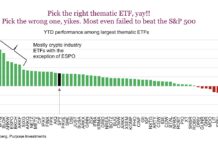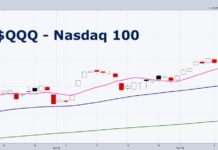Investor and Fidelity alum Peter Lynch is famed for “demystifying investing” by espousing the bedrock principle of “Investing In What You Know”. What could be more straightforward?
As any market vet will attest, the beguiling simplicity of Lynch’s democratizing appeal to use of one’s “local knowledge” skips over some difficult realities. For one: it’s possible as investors (or traders) that we’re so chronically and acutely ill-informed we can never know enough to adequately justify an investment or trade. The variables may be too many, or our capacity to know too obstructed or weak; but whatever the case, our ability to invest with reasonable certainty may be doomed from the very beginning.
For the sake of argument (and this article), let’s assume this isn’t true; or not true enough to really matter. After we’ve overcome the barrier to entry – i.e. capital scarcity – but before we can enter markets, there’s just one thing left to acquire: knowledge. How effectively we go about getting it, maintaining it and employing it poses the chief obstacle to our success; and more than any other single factor, will decide if we stay in the game – and how well we play.
Behind the processes we work with, media we consume and interactions we take part in as traders or investors, there’s an “epistemology of markets” we all bring to the table. Not only that, it’s something we study and apply at every turn with sustained intensity. Epistemology (from the Greek words episteme or “knowledge” + logos, “a word or statement about”) is our investigation of and knowledge about knowledge. There is a way we know what we know and a way we think about it – even if we act as if we’re not thinking at all – that epistemology sets out to explore.
Some of the overarching questions our epistemologies of trading answer:
- What do you know?
- How do you know it?
- How reliably (or unreliably) do you and can you know it?
- Is there adequate logical, experiential or evidence-based warrant for what you believe to call it “knowledge”? In other words: nevermind whether you know what you know – is there proof that you know it, at all?
- What is the possibility and relative ease of your access to what there is to know?
- Is there privileged knowledge; and if so why is it given this exalted place, who put it there, and how quickly or slowly does the privilege degrade (i.e. if knowledge provides an edge, once utilized how efficiently does the advantage dissipate)?
- How do you organize what you know?
- How do you measure the worth of what you know?
- Is there an ethic to knowledge? What should you know; and is there a benefit or imperative to always knowing more; or to setting limitations?
For most of us this “study” stays in the shadows as an implied discipline only; but that shouldn’t trivialize it. After all, in our routines, habits and practices we maintain an answer to each of these questions already. We all have a functional epistemology: a “theory of knowledge” that is vitally important to belief formation and how we go about executing on our decisions.
Thinking about what we know is never comfortable – in markets as well as in life. What starts out as an adventurous process becomes an exercise in skepticism and creative destruction. Honesty leads to disquieting realizations of our often tenuous grasp on “certainty”. Our much-vaunted adaptive rationality shatters against the implastic barrier of closely-held beliefs. Anywhere we work inside a body of knowledge – relationships, spirituality, business – how we answer these questions, and whether we think through or sleepwalk past them, is crucial to our experience.
So it’s tempting to ignore all of this: after all, our lives continue if we leave them unexamined. The problem is: taking a long hard look is often the only way to really progress.
Here are two simple questions we can think think about to begin assessing our own theory of market knowledge:
First, what do I know? As I type that I realize it sounds laughably abstract and as though it has no practical impact or positive utility for how we invest/trade whatsoever. But breaking it down, ask yourself:
- What beliefs do I hold as certain about myself as an investor/trader? What are the defining characteristics of my personality/identity?
- Do my process, habits and general conduct affirm these beliefs; or contradict them? If the latter, is this because there’s a gap between the beliefs I “officially” ascribe to and another set of beliefs I functionally hold?
These questions alone amount to opening an inquiry into your identity as a trader and the representation you hold in your mind of your identity as a trader. There’s a gap between these for each of us – but is it because of conscious aspirations and active cognitive construction we’re undertaking to refine our process and habits; or because of an unexamined, subconscious drift that separates what we think we know from what we truly believe? This rabbit hole goes deep and into some very uncomfortable places; but ultimately gets at the core of how we see ourselves as traders, how we behave as traders and what we hope to get out of markets (money, fulfillment, egotistic affirmation, etc.).
Second, how reliably do I (or can I) know it? This question really gets at the fundamental problematic of any epistemology: if we can’t establish the veracity of what we know – or even arrive at an incontrovertible conception of what “veracity” is – then we can’t “know” anything: only harbor beliefs on a spectrum of plausibility.
You may recognize in this the fundamental problematic we face as risk managers, as well:
- Can we know anything in the market with certainty?
- Is everything we hold as true ultimately a belief that is a) a function of probability and therefore b) subject to amendment?
Most of us would agree the answer to the first question is “yes”, albeit with major qualifiers. But is that even really the case?
- Do we entertain those cognitive biases that tell us this because no certainty means no sound bedrock on which we can rely in the market?
- Is there ever such a thing as “zero risk”; and if not, is the only certain thing that nothing is certain?
Setting all “theoretical” questions aside and assuming we can know, this is also applies to us as consumers of data/information/knowledge. How trustworthy are the sources we access? As curators, what criteria do we hold that our sources satisfy such that we want to access them, at all? Why is the information they provide valuable: because of how it informs flexible beliefs, or because it affirms inflexible ones? Does our process appropriate information from sources as data, carelessly admit it as narrative (especially when it tells us what we want to hear); or some amalgamation of the two? Do we believe our information is reliable because it is empirical even while we cherry pick it through the sieve of confirmation bias? Why do we bother with financial news media, at all, though we agree it’s slow, sordid and usually serves to entertain or incite rather than educate and empower?
This list of questions only scratches the surface; and yet it is more than most of us care (or dare) to consider. Ultimately, taking inventory of the theory of knowledge we bring to the market each day is an exercise in humiliation. We rarely know what we think we know (to say nothing of those things we don’t know that we don’t); but at least one things seems true: refining whatever we set out to do in life demands critical thinking about what we know and believe. The pursuit of mastery in trading is no different.
In the near future I hope to explore more about how our “applied epistemologies” impacts our individual beliefs and behaviors in the market; and ways our examination of it can lead to real improvements in our management of risk and psychological capital.
Twitter: @andrewunknown and @seeitmarket
Author holds no position in securities mentioned at the time of publication. Commentary provided is for educational purposes only and in no way constitutes trading or investment advice.
Any opinions expressed herein are solely those of the author, and do not in any way represent the views or opinions of any other person or entity.








